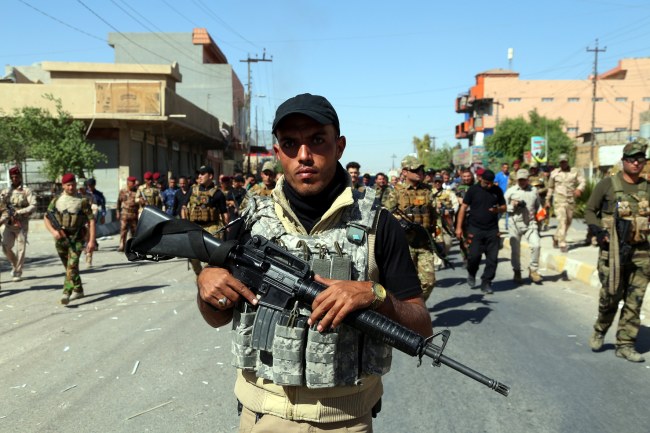Iraqi army retakes almost all disputed areas from Kurds
By Joel LeePublished : Oct. 18, 2017 - 20:53
BAGHDAD (AFP) - Iraqi government forces said Wednesday they had achieved their objectives in a lightning operation that saw them sweep through disputed Kurdish-held territory in a punishing riposte to an independence vote last month.
On Monday and Tuesday, federal troops and allied militia retook the northern province of Kirkuk and its lucrative oil fields, as well as formerly Kurdish-held areas of Nineveh and Diyala provinces.
The largely bloodless operation dealt a body blow to the finances of the autonomous Kurdish region, which had derived much of its revenues from exports of Kirkuk oil, and left Kurds in shock and disbelief just weeks after the nationalist fervour of the referendum.
Kurdish claims to the lost territories have long been a cherished national cause and their abandonment -- almost without a fight -- triggered recriminations against the Kurdish leadership.
Kurdish forces are now largely confined to their longstanding three-province autonomous region in the north and have lost nearly all of the territory they had taken since the US-led invasion of 2003, some of it in deadly fighting with the Islamic State group.

“Security has been restored in sectors of Kirkuk, including Dibis, Al-Multaqa, and the Khabbaz and Bai Hassan North and South oil fields,” the federal government‘s Joint Operations Command (JOV) said.
“Forces have been redeployed and have retaken control of Khanaqin and Jalawla in Diyala province, as well as Makhmur, Bashiqa, Mosul dam, Sinjar and other areas in the Nineveh plains.”
French geographer and Kurdistan specialist Cyril Roussel said that in the space of 48 hours, virtually all of the disputed territories held by Kurds had been brought back under federal control.
“The Kurds have lost almost all of the 23,000 square kilometres (8,900 square miles) that they had acquired since 2003,” Roussel told AFP.
“All that remains in their hands is between 5,000 and 6,000 square kilometres (1,930 and 2,300 square miles) in Nineveh province and the Kupri district of Kirkuk province.
“That’s virtually a return to the Green Line -- that is the three provinces of autonomous Kurdistan.”
JOC spokesman Brigadier General Yahya Rasool hinted that federal forces could yet be deployed to the remaining pockets of disputed territory still in Kurdish hands.
“It’s not a military operation but the redeployment of forces to all areas to enforce the law,” Rasool told AFP. “Further communiques will follow.”
Prime Minister Haider al-Abadi said on Tuesday that the September 25 vote for Kurdish independence was now “a thing of the past.”
“Central authority must be imposed everywhere in Iraq,” he said.
- Lion’s share of oil exports retaken -
In Kirkuk province, the Kurds now hold just a single oil field -- the Khurmala field, which produces barely 10,000 barrels per day of low quality heavy crude.
The field had been in Kurdish hands since 2008 and was not a target of this week’s operation.
But all five of the fields that the Kurds had taken since 2014 and were the source of the lion’s share of the autonomous region‘s oil exports were retaken by the federal government.
Baghdad was quick to move to exploit its new prize, calling on British energy giant BP to help develop the fields recovered from Kurdish forces.
Oil Minister Jabbar Luaybi appealed to the firm, whose origins lie in the development of oil in then British-ruled Iraq nearly a century ago, to “quickly make plans to develop the Kirkuk oil fields.”
The Iraqi oil ministry signed a consultancy contract with BP in 2013 to help the state-owned North Oil Company to develop the Havana and Baba Gurgur fields.
But it was never implemented as Baghdad lost control of the fields the following year during the chaos of the Islamic State group’s lightning offensive through northern and western Iraq.
BP says on its website that it has “provided technical assistance to the North Oil Company to aid the redevelopment of the Kirkuk field.”
It says that the field is estimated to have around nine billion barrels of recoverable oil remaining.
The lost fields accounted for more than 400,000 of the 650,000 barrels per day that the autonomous Kurdish region used to export in defiance of Baghdad.
Their loss deals a huge blow to its already dire finances and its dreams of economic self-sufficiency, and ordinary Kurds on Wednesday voiced dismay at the loss of Kirkuk.
“Kirkuk is Kurdistan‘s Jerusalem,” said 48-year-old businessman Hayo Babker.
Market trader Hassan Mohammed, from Sulaimaniyah, said he had “never felt so full of despair.”






![[From the Scene] Monks, Buddhists hail return of remains of Buddhas](http://res.heraldm.com/phpwas/restmb_idxmake.php?idx=644&simg=/content/image/2024/04/19/20240419050617_0.jpg&u=20240419175937)







![[From the Scene] Monks, Buddhists hail return of remains of Buddhas](http://res.heraldm.com/phpwas/restmb_idxmake.php?idx=652&simg=/content/image/2024/04/19/20240419050617_0.jpg&u=20240419175937)

![[KH Explains] Hyundai's full hybrid edge to pay off amid slow transition to pure EVs](http://res.heraldm.com/phpwas/restmb_idxmake.php?idx=652&simg=/content/image/2024/04/18/20240418050645_0.jpg&u=20240419100350)

![[Today’s K-pop] Illit drops debut single remix](http://res.heraldm.com/phpwas/restmb_idxmake.php?idx=642&simg=/content/image/2024/04/19/20240419050612_0.jpg&u=)